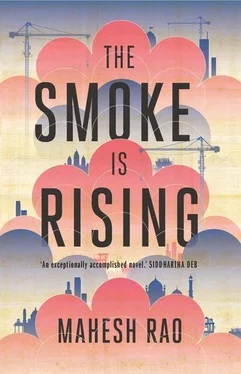The ‘theme park farmers’, as they had come to be known, were not the prominent agriculturalists whose vast acreages had borne fruitful political connections and clout. They were the anxious custodians of small tracts, already divided up many times over successive generations, and destined for further apportionment. Their place in the new economic order was even more unclear than the intentions of the sympathetic-sounding surveyors, consultants and brokers who were now making weekly visits to their homes. In recent months, a network of community leaders and NGO representatives had also been making those same journeys, contradicting the reassuring statements of the previous visitors and firing up more speculation and hearsay.
It was these community leaders who had organised the KR Circle protest. Their message was simple. The government was pulling at the loose thread of their livelihoods, rapidly unwinding them, turning a perfectly serviceable garment into a length of useless yarn that would not clothe their wives and children. Farmers who had already been tricked into selling their land for the new theme park and link roads had been given insulting levels of compensation. The weight of the state’s enforcement machinery was now being used to harass those farmers still refusing to sell their land.
All the concerned parties were becoming increasingly restive in anticipation of the High Court’s decision on the legality of the land acquisition notices and the calculation of compensation. But as far as the protestors were concerned, they had to keep shouting loudly. There was no need to think that the battle was drawing to an end as it was far from clear that the judges would side with the farmers. To make matters worse, there were also strong rumours that some of the land, instead of being used for the theme park, would be resold to developers at an eye-watering premium, who in turn would parcel off the land and dispose of it at exponentially inflated rates.
For its part, the government saw the matter with unimpeachable clarity. It had already provided — voluntarily, it wished to stress — vast quantities of indisputable evidence to demonstrate that the completion of HeritageLand was vital for the development of the region. Not only would it generate large amounts of wealth for all persons residing within the catchment area, it would add to the prestige and standing of the whole state. The government expressed unmitigated outrage at the suggestion that any land would be misappropriated by officials and sold on to developers. If such mean-spirited allegations were being levelled at the government, it demanded proof of the existence of these base intentions. The state had already guaranteed that the land acquisition would not take place for any unconscionable transactions, so it was unable to understand the nature of the farmers’ discontent. The government strongly suspected that the opposition was simply stirring up the emotions of these poor sons of the soil in order to make trouble in advance of the Assembly elections. If that were the case, the opposition had sunk to depths that the current legislators had never imagined possible. The government called upon all right-thinking members of the opposition to desist from this mischief as it was unethical, unconscionable and, most of all, un-Indian.
The assertions had gone back and forth during meetings, in newspapers, on television, at rallies and outside judges’ chambers. It was, however, an unfortunate but incontrovertible truth that even the most eloquently phrased arguments could be displaced by a rock hurled from behind a parked tractor or a lathi rammed into the sinews of a field hand from Nanjangud. It would probably never be known which came first, the rock or the lathi . But what followed was documented with great precision and made it into most Mysore sitting rooms in a couple of hours as hyperactive spates of breaking news.

A row had broken out at one end of the road, where a truck had tipped out a heap of sand, encroaching on the strip of tar next to some half laid pipes.
‘Oh, oh, is this your father’s road? Take your rubbish and dump it somewhere else.’
A man in his mid-twenties had come running up to the side of the truck, gesturing at the sand.
The truck driver stopped drumming his fingers on the steering wheel and looked at the man.
‘Take my father’s name again and see what I do,’ he said.
‘How can you just block the road like this? We are having a function at home and a hundred people are coming down this way. What will they think?’ asked the man, squinting up at the driver, his hand shading his eyes.
‘I don’t know anything about that. I am just doing what the building people told me. Go and speak to them inside,’ said the truck driver.
Shankar was about to challenge the driver further but then changed his mind. It was too hot, there were still so many things left to organise and he knew that the sand would never make its way back into the truck. He walked back home, his mobile phone pressed against his ear, calling a rickshaw driver to make sure that his wife’s grandparents would be picked up in an hour, and then calling a distant cousin whom he had forgotten to invite. Better to confess now than to have to deal with the consequences of not inviting him at all.
The area in front of his house was covered by a bright red canopy, nailed down on to wooden poles on either side of the road. Rows of trestle tables and folding chairs occupied the centre of the road, providing shelter to a number of opportunistic stray dogs that would be banished later. A number of his mother’s female relatives were standing in the doorway of his house and in its tiny front courtyard. A handful of Mysore silks crowded against some handloom cottons in the paltry shade cast by a tilting coconut tree; the talk was of the persecution effected by the school holidays. Shankar squeezed past the women and looked around for his wife, Janaki. He entered the house, walked down the dark corridor and knocked on the locked bedroom door. Janaki’s sister let him in and shut the door again. He smiled sheepishly at Janaki’s mother and Uma, who were sitting on a mat in the corner.
Janaki was lying on the bed, directly under the fan, its revolutions only sending down coils of feverish air. Her heavy green and gold sari seemed to weigh her down like a shroud and the sweat on her face had left her forehead spattered with pale patches where her powder had smeared.
‘What other tortures have you got planned for me? Huh?’ she asked, without opening her eyes.
‘Are you not well?’ asked Shankar.
Janaki did not respond. Shankar looked at Uma and Janaki’s mother for assistance.
‘Please Janaki, it’s only a few hours, then you know you’ll be going to your mother’s house for six months. Or however long you want. Please, just for today,’ he begged.
Janaki opened her eyes and the expression in them softened.
‘Okay, don’t be tense. I said I would do it, so I will. I just don’t want to go and sit out there among those women until the last minute. You don’t know what it’s like being seven months pregnant and having to dress up like a festival cow, that too in the middle of summer. Now go, even your breath is making this room hotter.’
It was commonly acknowledged in their circle that Janaki had been extremely lucky in marrying Shankar, a handsome young man who was doing very well and, it was surmised, would do even better. He had started out as the apprentice to a small-time carpenter but had quickly learnt his trade and sought work in the expanding industrial area south of Mysore. A loan from a government scheme for small-scale entrepreneurs had meant that he had soon been able to start his own workshop. He had recently opened a second unit, taken on extra staff and was now able to meet large orders for cabinets and fittings from a chain of sports equipment shops in the city.
Читать дальше













